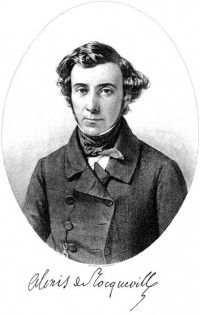
Biography
Alexis de Tocqueville (1805–1859) was a French philosopher and statesman. Belonging to a Norman aristocratic family that traced its origins to the Battle of Hastings (1066), Tocqueville’s parents barely escaped the guillotine in the terror of the French Revolution. After studies in Metz and Paris, Tocqueville became a magistrate, but quickly grew bored by narrow legal work. In 1831, King Louis-Philippe commissioned Tocqueville and his friend Gustave de Beaumont to study prison conditions in the United States, and the two travelled to America over nine months in 1831 and 1832. Tocqueville drew on this experience to produce his two-volume masterpiece, Democracy in America (1835/1840). Tocqueville would also travel to England, Ireland, and Algeria, writing noteworthy accounts of these voyages. He conducted correspondence with many of the most notable public and intellectual figures of the day, including the English liberal John Stuart Mill.
Politically as well as intellectually ambitious, Tocqueville served as a deputy and sometime advisor to Louis-Philippe during the July Monarchy, and he became known around the court as the bright jurist who had written on America. In 1848, Tocqueville correctly foresaw and warned his fellow deputies about impending revolution in an important speech in the Chamber of Deputies: “Do you not hear [the working classes] repeating…that the present distribution of goods throughout the world is unjust?… that property rests on a foundation that is not an equitable foundation?” After the revolution of 1848, Tocqueville agreed to serve in the newly-proclaimed Second Republic, not because he was a convinced republican, but because, as he put it, he “saw nothing to put in its place.”
Tocqueville supported the government side in the small-scale civil war known as the “June days” of 1848, when workers demanding a radical socialist republic rose up against the provisional, more moderate, republican government. In the presidential election of 1848, he supported General Louis-Eugene Cavaignac, the man responsible for putting down the workers’ rebellion, rather than the upstart ex-convict with a famous last name, Louis-Napoleon Bonaparte, nephew of Napoleon Bonaparte. Nonetheless, he agreed to become a minister under the new “Prince-President” Louis-Napoleon. He very briefly served as minister of foreign affairs, during which time he counseled Bonaparte against hasty attempts to regain pre-1815 French territory from the Germanic powers. Briefly imprisoned after Louis-Napoleon Bonaparte’s coup d’état in 1851, Tocqueville refused to take the oath of allegiance to Bonaparte and retired from political life. He devoted his remaining years to writing, particularly his unfinished second masterwork The Old Regime and the Revolution (1856), and the Souvenirs of his political activities. Always of fragile health, Tocqueville retired to Cannes in 1858, where he died in 1859.
In the words of Harvard political scientists Harvey Mansfield and Delba Winthrop, Democracy in America is “the best book ever written on democracy and the best book ever written on America.” Tocqueville characterizes the social, political, religious, and intellectual habits of the Americans with such deep understanding that, nearly two centuries later, Americans still learn about themselves through the Frenchman’s account. But Tocqueville’s subject was as much “democracy” as it was “America.” Tocqueville thought the American republic represented something new in world history: a country that had been born democratic and in which democracy appeared in its perfected or most advanced form. By describing democracy in America, Tocqueville sought to produce “an image of democracy itself.”
In his Old Regime and the Revolution, Tocqueville reorients himself toward Europe but retains his focus on the development of democratic conditions. In the introduction to Democracy in America, Tocqueville asserts that democracy, or the “equality of conditions,” was a “providential fact” which could not be stemmed. In The Old Regime, he demonstrates this by questioning the revolutionary character of the French Revolution. By contrast to those who claimed that the French Revolution swept away deeply entrenched class distinctions, Tocqueville explains how such distinctions had been eroded over centuries throughout Europe. Kings, noblemen, and bourgeois had all played an unwitting part in producing the real revolution, the equality revolution, that had long preceded the French Revolution.
For further biographical reading, see also:
André Jardin, Tocqueville: A biography, trans. Lydia Davis Baltimore: 1988.
Harvey C. Mansfield and Delba Winthrop, Introduction to Democracy in America, Chicago: 2000.